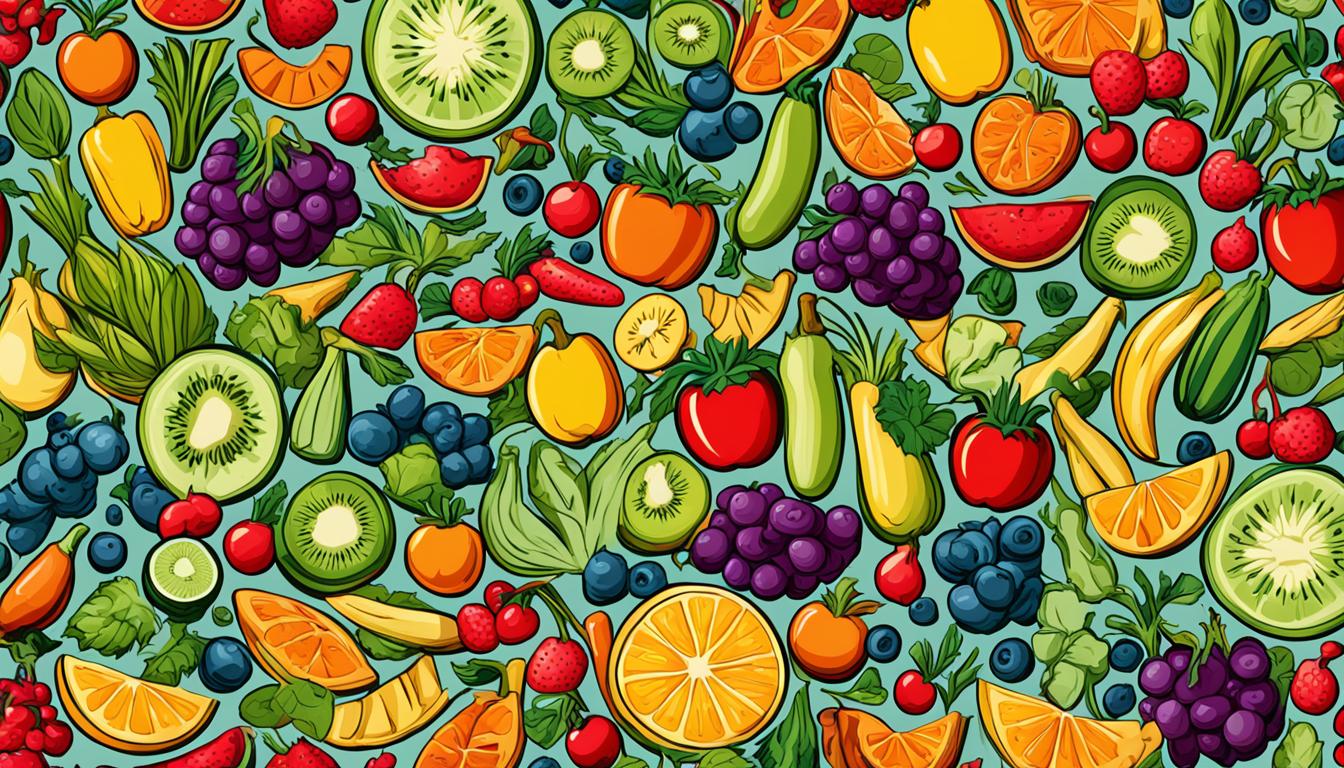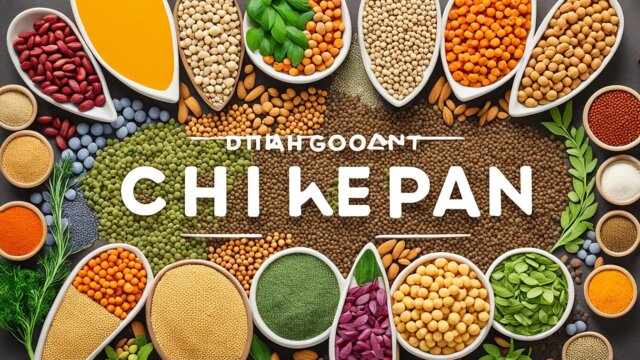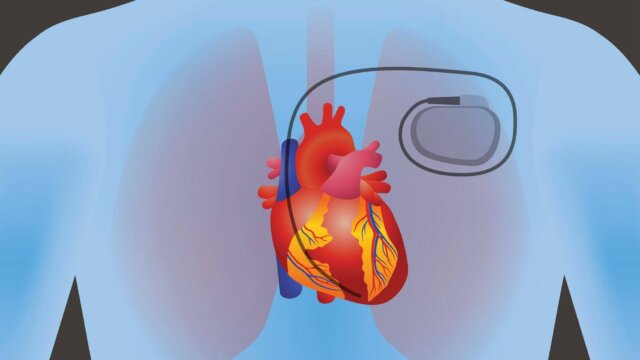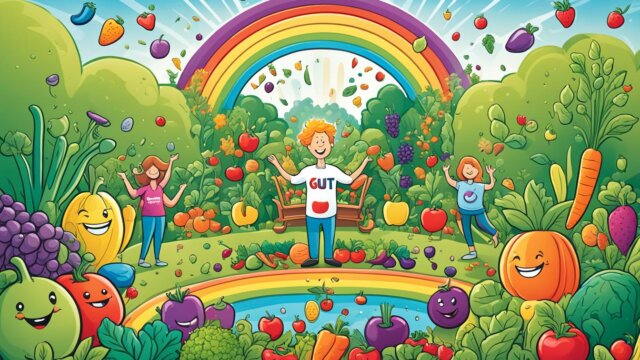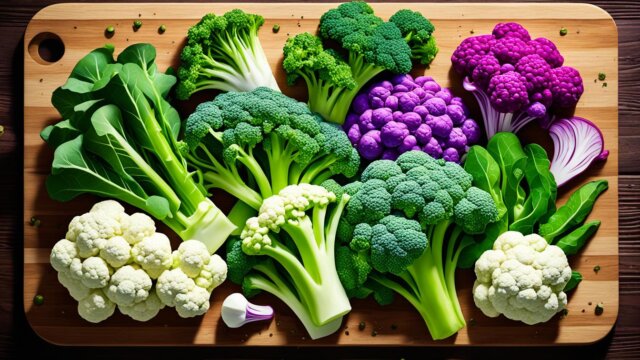FTC disclaimer: This post may contains affiliate links and we will be compensated if you click on a link and make a purchase.
Did you know that 95% of Americans do not eat enough fiber? This number shows a big difference between what we need and what we eat. Fiber is in many plant foods and helps our gut stay healthy. It is important for our overall health.
The gut is like our “second brain” and it is full of many tiny living things. These tiny living things help keep us healthy. They help our immune system, control inflammation, and even affect our feelings and actions. But, if something upsets these tiny creatures, it can cause many health issues.
Key Takeaways:
- 95% of Americans do not eat enough fiber
- Fiber-rich foods are good for our gut’s tiny world
- Fiber makes sure we go to the bathroom regularly and keeps our gut healthy
- Fiber helps with conditions like constipation and pains around the bottom
- Eating more fruits, vegetables, and whole grains is a good way to get more fiber
Fiber-rich foods are very important. They come from plants like whole grains, fruits, veggies, and legumes. These foods feed the good bacteria in our gut. Eating more of these foods helps keep our gut healthy. It also makes our immune system better and lowers the chance of getting sick.
It’s interesting how quickly our gut can change. Going from eating mostly meat to eating mostly plants in just a day can make a big difference. This shows how important our food choices are for the bacteria in our gut.
There are many foods that are good for our gut. Things like sauerkraut, Jerusalem artichokes, onions, and avocados are high in fiber. Adding these foods to what you eat can make your gut and you feel better.
The Importance of Gut Health
The Gut Microbiome and Its Impact
The gut microbiome is a community of tiny organisms living in our gut. This community is key to our health. It helps the immune system, controls inflammation, and even affects our mood. An imbalance in these good and bad bacteria can cause a lot of health issues. This includes digestive problems, immune diseases, and mental health issues like anxiety and depression.
Eating right is critical for a healthy gut. Adding more fiber to your diet is smart. It lowers your risk of heart disease and cancer. Fiber also helps you feel full. This means you eat less and stay satisfied, which helps with weight management. Snacking on things like fruits, veggies, popcorn, and nuts is a great way to get more fiber into your meals. Remember, drink water with your fiber. This helps keep things moving in your gut.
Yet, many Americans don’t get enough fiber in their diets. The recommended amount is 25 grams a day for women and 38 grams for men. But, the average American adult only gets about 15 grams each day. Adding foods like beans, peas, lentils, and whole grains to your meals can help boost your fiber intake.
A healthy gut is vital for a healthy life. Eating enough fiber can lower the risk of many health problems. Foods high in fiber reduce inflammation and lower the risk of death from any cause by 10 to 20 percent. By looking after our gut health, we can improve our lives and lower the risk of chronic diseases.
“Gut health is the foundation of overall health and well-being.”
Probiotics: The Good Bacteria
Probiotics are living bacteria and yeasts that are great for our health, mainly for our gut. They are known as “good bacteria” since they help keep our gut’s bacteria in balance. These tiny organisms are just like the good bacteria already in our stomach. By taking probiotics, we can fill up on the good bacteria we might lose. This can happen from taking antibiotics, having a bad diet, stress, or being sick. Probiotics can make our digestion better, less swelling, boost our immune system, and even help our mind.
Yogurt, kefir, kombucha, tempeh, and miso are tasty, probiotic foods. Yogurt stands out as a big source of probiotics. It helps our bones, heart, and stomach. It can lower the chance of getting diabetes and some cancers, and it can help manage weight. Kefir, which is a fermented milk drink, has many types of helpful bacteria and yeasts. This makes it more powerful than yogurt for probiotics. It can help bones, digestion, and fight off infections.
Sauerkraut is cabbage fermented by good bacteria. It is full of fiber, vitamins C and K, and has a lot of sodium. It also has eye-healthy antioxidants, lutein and zeaxanthin. Tempeh, from fermented soybeans, is rich in protein. It can make our bodies better at taking in minerals, thanks to the process it goes through. It also has vitamin B12, which is great for people who don’t eat meat.
Kimchi is a Korean food made from spicy, fermented cabbage. It is packed with vitamins and minerals like vitamin K, riboflavin, and iron. It has good bacteria that helps with digestion. Miso is a paste made from fermented soybeans. It gives us protein, fiber, and lots of vitamins and minerals. Research shows miso might cut the chance of getting cancer, obesity, high blood pressure, and help with cholesterol.
Kombucha is a tea that ferments to help our health by adding good bacteria. It might lower the risk of cancer and diabetes. Pickles, cucumbers fermented in a salty water, are low in calories and full of probiotics. They also bring a lot of vitamin K. Buttermilk, the water left after making butter, has probiotics too. It’s good for you, being low in fat and calories, but rich in B12, riboflavin, calcium, and phosphorus.
Natto is a fermented soy dish that is rich in protein and vitamin K2. This is great for our bones and heart, and it might lower the risk of fractures from osteoporosis. Some cheeses, like cheddar, mozzarella, or gouda, can have probiotics when they say “live cultures” or “active cultures” on them. Cheese is full of good things like vitamins A, B6, B12, D, and K, and minerals like calcium, magnesium, and zinc.
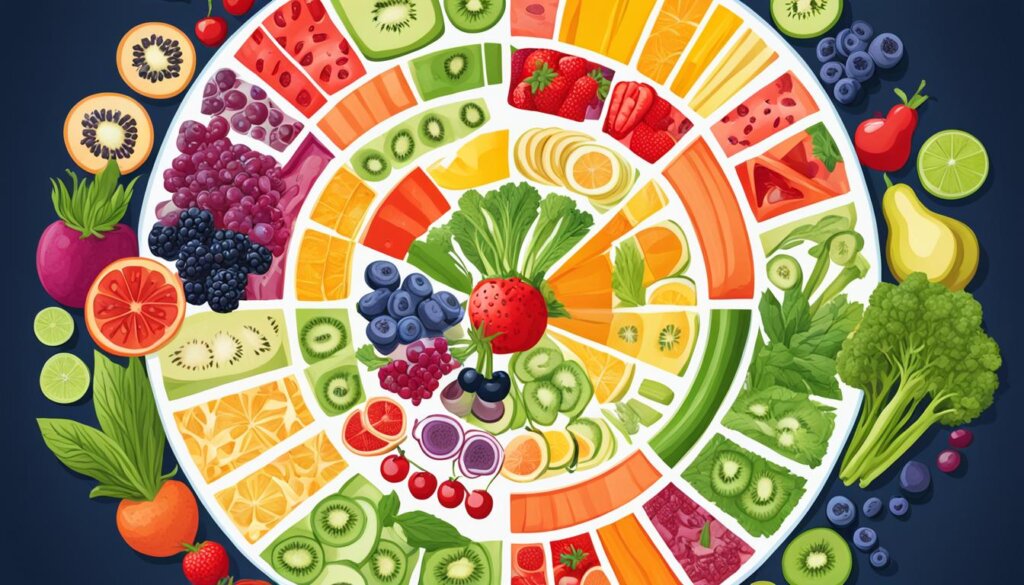
Prebiotics: The Fuel for Probiotics
Prebiotics and Their Role
Prebiotics are a special kind of fiber in food that we can’t digest directly. They go through our gut without changing much. But, they feed the good bacteria living in our gut, called probiotics. So, prebiotics work like food for these helpful bacteria, aiding in their growth.
You can find prebiotics in many plant foods. This includes fruits, veggies, whole grains, and legumes. Some top picks are bananas, garlic, onions, and Jerusalem artichokes. Also, barley has a fiber type, beta-glucan, that may help your heart. It could lower cholesterol and reduce heart disease risk. Cocoa is good too. It offers polyphenols like flavanols, which nourish good gut bacteria and hinder bad bacteria’s growth.
Prebiotics team up with probiotics to keep our gut healthy. A good gut can improve digestion, make your immune system stronger, and boost overall health. Eating foods with prebiotics, like avocados and seaweed, can really benefit your gut.
Prebiotic-rich Foods | Prebiotic Fiber Content |
|---|---|
Chicory root | Approximately 68% of the fiber is the prebiotic inulin |
Konjac root | 70% to 90% of the fiber is the prebiotic glucomannan |
Wheat bran | Contains arabinoxylan oligosaccharides (AXOS), which can boost healthy Bifidobacteria |
Adding prebiotic-rich foods to your meals is a great idea. It helps your gut’s health and your well-being.
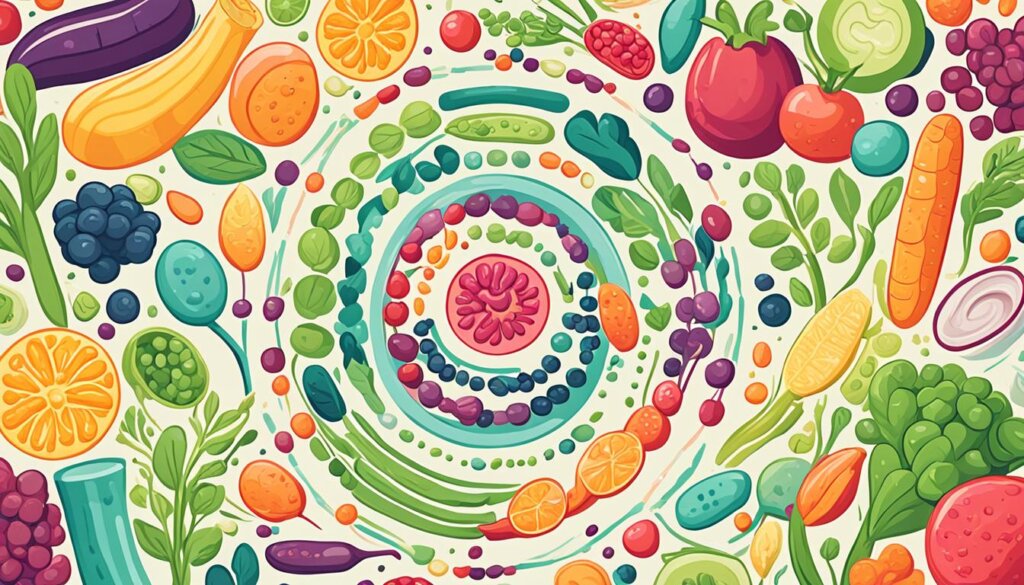
Fiber-rich Foods and Gut Health
Eating lots of fiber-rich foods is key to a healthy gut. This includes fruits, veggies, whole grains, and legumes. These foods help our digestion and keep our gut full of good bacteria. They also help us go to the bathroom regularly and fight off inflammation.
Soluble fiber is in foods like oats and beans. It makes us feel full and slows down how fast we digest food. Insoluble fiber, in whole wheat and veggies, keeps us from getting constipated. Mixing lots of different fiber-rich foods into your meals is good. It helps your gut have many types of helpful bacteria. This means you’re less likely to have tummy problems and serious illnesses.
- A cup of kidney beans can give you a big chunk of your daily fiber needs.
- The Academy of Nutrition and Dietetics suggests eating 14 grams of fiber for every 1,000 calories you have.
- But, most Americans only get about 15 grams a day. That’s way less than what we should have.
Age Group | Fiber Intake (grams per day) | Gender |
|---|---|---|
Children 1-3 years | 19 g | Both |
Children 4-8 years | 22 g | Both |
Girls 9-13 years | 26 g | Female |
Boys 9-13 years | 31 g | Male |
Girls 14-18 years | 26 g | Female |
Boys 14-18 years | 38 g | Male |
Women 19-50 years | 25 g | Female |
Men 19-50 years | 38 g | Male |
Women 51+ years | 21 g | Female |
Men 51+ years | 30 g | Male |
Eating fiber can lower your cholesterol and keep you from getting constipated. Foods high in fiber are usually low in calories. They’re great for managing your weight. Fiber slows down how fast we digest food. This makes us feel full longer. It also helps keep our blood sugar in check by slowing down how our body absorbs sugar. And, eating enough fiber can lower the risk of some cancers, like colon cancer.
You can get fiber from foods like pears, strawberries, and avocado. Oats, apples, and bananas are great too. For more fiber, try beets, broccoli, and kale. Legumes such as kidney beans and chickpeas have lots of fiber. Quinoa and popcorn are good grain sources of fiber, and almonds are a top nut pick for fiber. Eating whole grains is another easy way to add fiber to your diet.
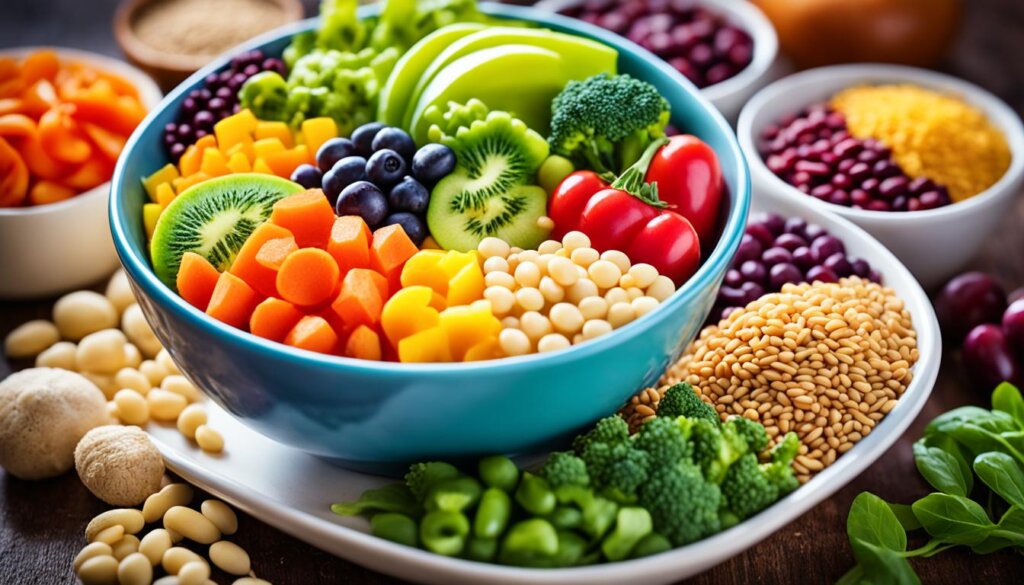
Making fiber-rich foods a big part of your meals helps your gut a lot. This leads to better digestion, less inflammation, and a lower chance of getting sick. Adding these foods to what you eat every day is both simple and powerful for improving your health.
Balancing the Gut Microbiome
Keeping your gut microbiome balanced is key to feeling good all over. Yet, many folks don’t eat enough fiber each day. Such low intake shakes up the variety and jobs of our gut bugs. But, fret not! There are steps you can take to give your gut the care it needs.
Strategies for a Healthy Gut
One top way to even out your gut is by eating a mix of probiotic and prebiotic foods. Foods like yogurt and kefir are full of probiotics, which are good for the gut. And don’t forget prebiotics – found in veggie friends like artichokes and grains, they help probiotics grow and do their job.
Try to eat less processed foods, red meat, and fake sugars – these steps can aid your gut health. On the flip side, more moving and less stressing can up the game of your gut bugs.
Following these tips can boost your gut and overall health. Aiming for lots of fiber and keeping your lifestyle gut-friendly is the secret.
“Dietary fiber-deprived gut microbiota can degrade the colonic mucus barrier and enhance pathogen susceptibility.”
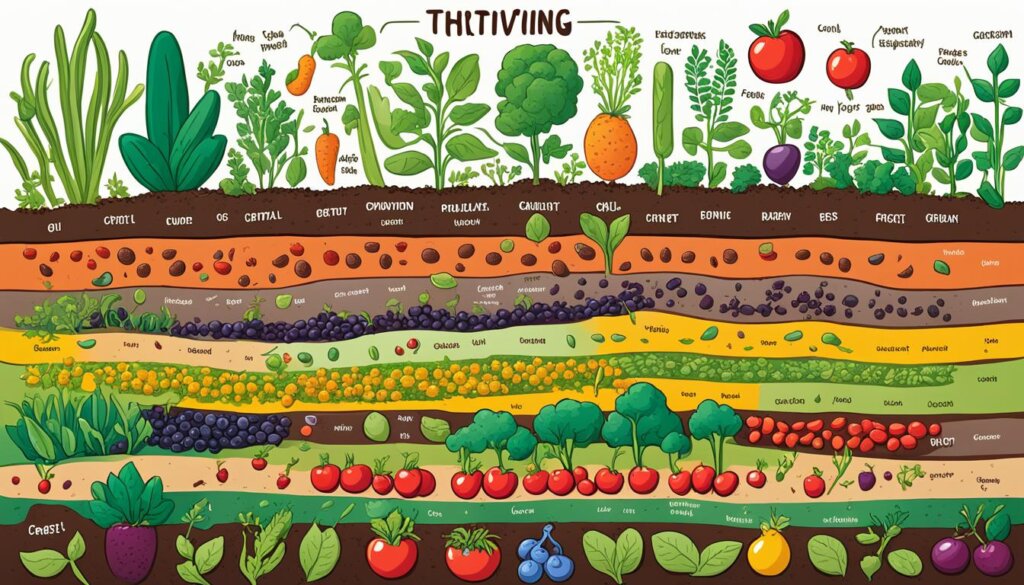
A happy gut means a happier you. With some easy shifts in what you eat and how you live, good gut health is in your hands. And the benefits are long-lasting.
Probiotic Supplements
Probiotic supplements can help boost your gut health. This is great if you don’t eat probiotic-rich foods often or if you have health issues. They come in capsules, powders, and liquids. You can buy them at the store or your doctor might recommend them.
It’s key to pick a probiotic that’s top-quality. Make sure it has many different types of good bacteria. More types of probiotics can mean more health benefits. They can help your gut and how well you digest food. Also, always follow the dosing instructions and talk to a doctor first. This is especially important if you’re dealing with health issues or if you take other medicines.
Probiotic supplements are good for the gut because they help its friendly bacteria grow. A healthy gut is important for digesting food, getting nutrients, and keeping your immune system strong. But, not all probiotics are the same. Some might not work as well or have as many good bacteria. So, do some research and pick one from a trusted brand with good quality checks.
Finding the right probiotic means looking for one that fits your health needs. Along with eating foods high in prebiotics, probiotics can keep your gut healthy. A healthy gut can help your body in many ways, which is great for your overall health.
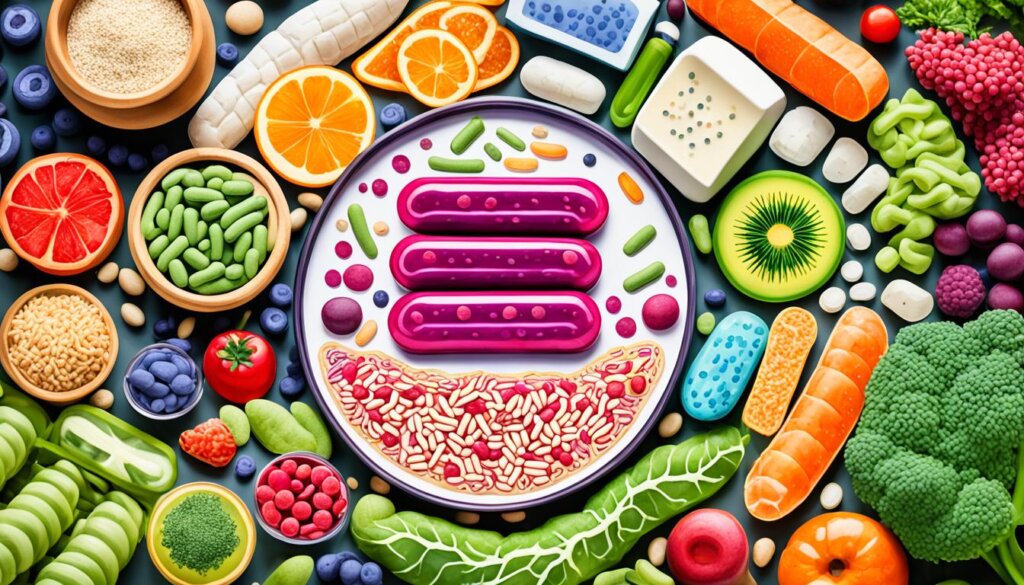
“Maintaining a healthy gut microbiome is essential for overall wellbeing, and probiotic supplements can be a valuable tool in supporting that process.”
Fiber-rich Foods and Gut Health: A Healthy Duo
Fiber-rich foods and gut health really work well together. Foods like fruits, veggies, whole grains, and legumes help good gut bacteria, or probiotics, stay healthy. These probiotics help keep our guts balanced and healthy. This affects our digestion, lowers inflammation, and boosts the immune system.
Prebiotics are also important. They’re a type of fiber that our bodies can’t break down. They work like food for the probiotics, helping them grow strong. By eating lots of foods that are rich in fiber, probiotics, and prebiotics, we can keep our digestion in top shape. This leads to feeling better overall.
- Dietary fiber aids in digestion, manages weight, stabilizes blood sugar levels, and promotes heart health.
- Soluble fiber dissolves in water and helps lower cholesterol levels and regulate blood sugar.
- Insoluble fiber adds bulk to stool, promoting regular bowel movements and preventing constipation.
- Soluble fiber acts as a prebiotic, promoting the growth of beneficial gut bacteria.
- High-fiber foods contribute to satiety, aiding in weight management and controlling appetite.
- Soluble fiber slows down sugar digestion and absorption, regulating blood glucose levels.
- Soluble fiber binds to cholesterol molecules, helping remove them from the body, thus reducing the risk of cardiovascular diseases.
Eating different fiber-rich foods is very beneficial for your health. Beans, lentils, and chickpeas are full of fiber, good for your digestive system. Berries, apples, carrots, and leafy greens are super high in fiber, ensuring you get a lot of fiber types. Almonds, chia seeds, and flaxseeds have lots of fiber and good fats. Potatoes, sweet potatoes, and beets are tasty with their skin on and are packed with fiber.
Just one medium-sized apple has about four grams of fiber, helping you avoid feeling hungry between meals. A half-cup of hummus has 6.75 grams of fiber. One cup of frozen spinach gives you 4.52 grams of fiber. Adding these foods to your diet supports a strong gut and wellness.
“Roughly 70% of the immune system resides in the gut, underlining the importance of supporting digestive health for overall wellness.”
To stay healthy, focus on eating a variety of fiber-rich, probiotic-rich, and prebiotic-rich foods. This way, you can build a healthy gut. And that’s key for your health and feeling good.
The Importance of Diversity
A diverse and thriving gut microbiome is key to good health. Like how many different kinds of plants make an ecosystem stronger, a varied gut community does the same for us. Eating over 30 different plant foods a week boosts the number of good bacteria in your gut. It also increases certain fats that are really good for you.
A study by the American Gut Project showed this. Those who ate more than 30 types of plant foods had healthier guts than those limited to 10 or fewer kinds. In other words, eating lots of different plants is great for your gut health.
Variety in Your Diet
To help your gut be diverse, eat lots of plant foods. This includes fruits, veggies, grains, and legumes. These foods are full of fiber, which is great for your gut because it feeds the good bacteria. Plants also have polyphenols.
They help your gut bacteria and bring health benefits. Aim to eat 30 different types of plant foods every week. It’s good for your gut health. We’ll also give you tips on how to do it.
Add probiotic-rich foods too. They bring new good bacteria to your gut. This makes your gut stronger and healthier. In a study, people were asked to eat either lots of fiber or lots of fermented foods for 10 weeks. Those who ate fermented foods got more kinds of bacteria in their gut. Meanwhile, the fiber eaters’ gut bacteria stayed the same. Eating more fermented foods helps your gut even more. This study was in the journal Cell.
Being vegetarian or vegan is not the only good choice. Eating a wide variety of plant foods is what matters most. It’s crucial for a strong and varied gut. The text highlights this point.
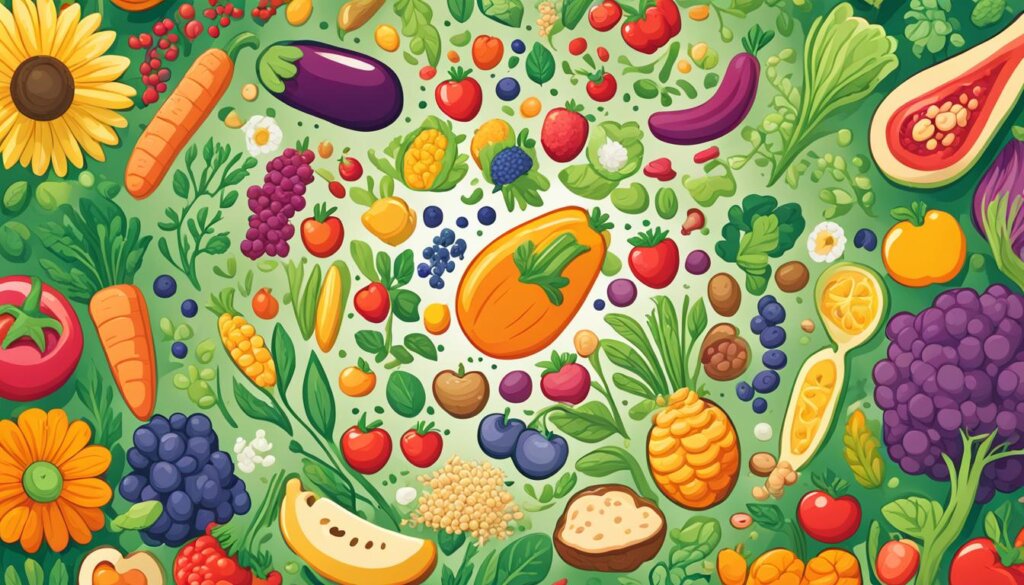
“Consuming a diverse array of plant-based foods and fermented foods is key to supporting a thriving gut microbiome, which is essential for overall health and well-being.”
More people are searching for “microbiome” online now than before. This trend shows growing interest in gut health. Many people don’t eat enough fruits and veggies, leading to potential gut problems. The U.S. Dietary Guidelines recommend eating a mix of grains, vegetables, legumes, nuts, soy, and fruits. This helps get enough fiber, which is 85% of our food supply. A survey found that most folks care about how their food is grown. Many worry about pesticides. As a result, a lot of people avoid fruits and vegetables that might have pesticides.
Dietary Factors | Impact on Gut Microbiome Diversity |
|---|---|
Consumption of over 30 plant foods per week | Greater diversity of gut bacteria |
Inclusion of fermented foods in the diet | Increased overall microbial diversity |
High-fiber diet alone | Insufficient to increase microbiota diversity over a short time period |
To sum up, having a varied gut microbiome is very important. Eat lots of different plant foods. Add in fermented foods too. This helps your gut be healthy and strong. By eating a wide range of foods, you can make your gut better. This leads to many health benefits from having a balanced and varied gut.
Gut Health and Overall Well-being
Your gut health is super important for your whole well-being. A good mix of tiny organisms in your gut can boost your immune system and cut down inflammation. It even affects your mood and how well you think. If this mix is off, it might lead to serious health issues like obesity, diabetes, and heart problems.
To keep your gut healthy, eat foods with lots of probiotics and prebiotics. Plus, do things that are good for both your body and mind. This helps fight off long-term diseases and makes your life better. Foods high in soluble fiber, including bananas and sweet potatoes, control sugar and cholesterol.
Those with insoluble fiber like whole grains keep your digestion and waste removal on track. Eating different fiber foods helps you get the best of both kinds for your health.
Many studies link a healthy gut to overall well-being. For example, eating like they do in the Mediterranean is great for your heart and gut. It’s full of fiber, prebiotics, and good fats that help in many ways. The little fatty acids from your gut’s bacteria do a lot to keep you healthy and happy.
Fiber is key, but most Americans don’t get enough. Adults average about 10-15 grams daily, way below the 20 to 35 grams they should have. By eating more foods with fiber, you can slowly up your fiber intake. This change is really good for your gut and your whole being.
Always remember, a healthy gut equals good health all around. Doing things that make your gut happy also boosts your immune system and lowers inflammation. This can make you feel better mentally and physically, making your life better.
Incorporating Probiotic and Prebiotic Foods
Keeping a healthy gut is vital for being healthy overall. Eating foods rich in probiotics and prebiotics is crucial. Probiotics are living microorganisms in your gut. They have good effects on your health. Prebiotics are what these microorganisms need to grow.
Eating a mix of these foods is key when planning your meals. Things like garlic, onions, and bananas are great for prebiotics. For probiotics, look for yogurt, kefir, and fermented foods. This mix helps your gut stay healthy and boosts your well-being.
Meal Planning for a Healthy Gut
Making meals with both probiotic and prebiotic foods is tasty and good for you. For breakfast, try oatmeal topped with berries and seeds. Add Greek yogurt or kefir on the side for a morning full of goodness.
Lunch could be a veggie salad with a dressing made from apple cider vinegar and olive oil. Have it with quinoa or whole-grain bread. This meal gives your gut the fiber and health it needs.
Dinner offers many ways to keep your gut happy. A stir-fry packed with vegetables and topped with garlic and onions is a good choice. Adding kimchi or sauerkraut brings more probiotics. Eating garlic, onions, and underripe bananas helps gut bacteria and manages weight.
Focusing on gut health in meal planning is a smart choice. Studies link eating probiotic and prebiotic foods with lower stress and anxiety. A healthy gut is truly important.
To improve gut health more, try making sauerkraut and kimchi at home. These offer more probiotics and are great for your digestive system.
“Incorporating a variety of probiotic and prebiotic foods into your diet is key to maintaining a healthy gut microbiome and supporting overall well-being.”
The Gut-Brain Connection
Current studies show a strong tie between gut and brain health, known as the gut-brain axis. Trillions of tiny organisms in our gut, or gut microbiome, affect how our brain works. They control making chemicals like serotonin and dopamine, which help regulate our mood and thinking. When the balance in our gut is off, it might lead to issues like anxiety and depression.
The link between the gut and the brain is both fascinating and complex. Our gut has as many as 500 million neurons. They talk to the brain via the vagus nerve, a vital route for the gut and brain to communicate. The gut’s tiny tenants can make chemicals too, influencing the brain. This means our brain can affect our gut bugs as well.
Eating foods rich in probiotics and prebiotics keeps the gut healthy and can lift our spirits. Some probiotics help make a calming chemical called GABA, which can lessen feelings of anxiety and depression. Also, special fatty acids from gut bugs can help our brain work better and make us feel less hungry.
The gut-brain tie shows why it’s crucial to think about health as a whole. Good gut care can do wonders for our both our body and mind. Adding fiber-rich foods, probiotics, and prebiotics to our meals helps our gut. It might even boost our mental health.
Our gut and brain talk to each other all the time. What we eat affects this conversation. Keeping our gut healthy also keeps our brain in good shape. It’s a key reminder that gut health matters for our over-all wellness.
“The gut is sometimes referred to as the ‘second brain’ due to its vast network of neurons and its ability to influence the central nervous system.”
To sum up, the connection between the gut and brain is a hot topic in research. It shows how important gut health is for our mental well-being. We can help our gut by eating things like fiber-rich foods, probiotics, and prebiotics. This choice is an active way to care for our gut bugs and maybe feel better.
Conclusion
In conclusion, fiber-rich foods and gut health are very connected. Fiber-rich foods, like fruits, veggies, whole grains, and legumes, feed the good bacteria in our gut. This helps keep our gut healthy, which is super important for our overall health and well-being.
Eating a lot of fiber-rich, probiotic-rich, and prebiotic-rich foods is good for us. It makes our gut healthier, boosts our immune system, and even helps our mental health. Eating enough fiber also helps with losing and is good. But, many Americans only get half the fiber they need each day.
Choosing to care for our gut health can make a big difference in our lives. Eating plenty of fiber-rich foods helps our gut be healthy. This supports our whole health, making us feel better and more alive.
FAQ
What is the gut microbiome and how does it impact health?
The gut microbiome is a mix of tiny organisms in our digestive system. These include bacteria, fungi, and viruses. They keep our body in check, reduce inflammation, and affect our mood. An unbalanced gut can cause digestion, immune system, and mental health issues.
What are probiotics and how do they benefit gut health?
Probiotics are good bacteria found in live bacteria and yeasts. They help keep our gut’s bacteria balanced. These good bacteria boost digestion, lower inflammation, enhance our immune system, and help our mental health.
What are prebiotics and how do they work with probiotics?
Prebiotics are special fiber. Our bodies can’t digest them directly. They pass through our system, feeding the good bacteria in our gut. This “fertilizer” helps the good bacteria thrive, working with probiotics for a healthy gut.
How do fiber-rich foods support gut health?
Foods like fruits, veggies, whole grains, and legumes are full of fiber. They come in two types, helping our gut in different ways. These foods regulate our bowels, lower inflammation, and nourish the good bugs in our gut. Eating a mix of them is great for our digestion and helps prevent disease.
What are some strategies for maintaining a healthy gut microbiome?
Eating a variety of probiotic and prebiotic-rich foods, like fermented dairy, veggies, and whole grains, helps.** Not eating lots of processed foods, red meat, and artificial sweeteners is good. Being active and handling stress well also helps keep our gut in balance.
When should one consider taking probiotic supplements?
If eating probiotic-rich foods is hard or you have health issues, probiotic supplements are a good choice. Choose a high-quality supplement with many beneficial bacteria strains and follow the dosage instructions. Talking to a doctor before starting any new supplement is wise.
How does the diversity of the gut microbiome impact overall health?
An abundant gut microbiome is key to staying healthy. A diverse mix of gut bacteria means better health. Eating various plant-based foods supports this variety, especially types that are rich in prebiotic fibers.
What is the connection between gut health and brain function?
Recent studies show a strong link between gut and brain health, known as the gut-brain axis. The gut’s tiny life forms produce brain chemicals like serotonin and dopamine. These are vital for our mood and thinking. A healthy gut from eating probiotic and prebiotic-rich foods benefits our mental health.
